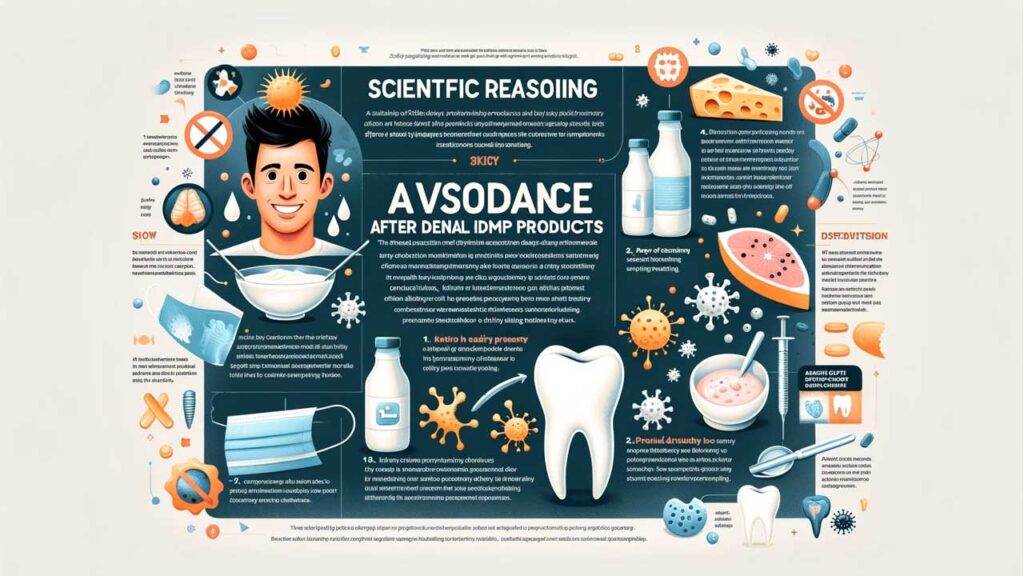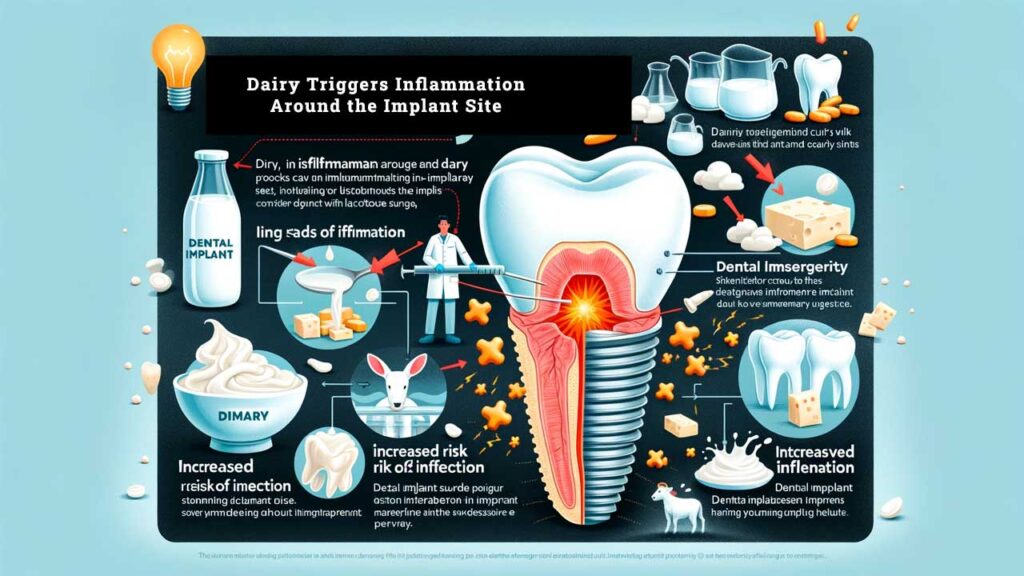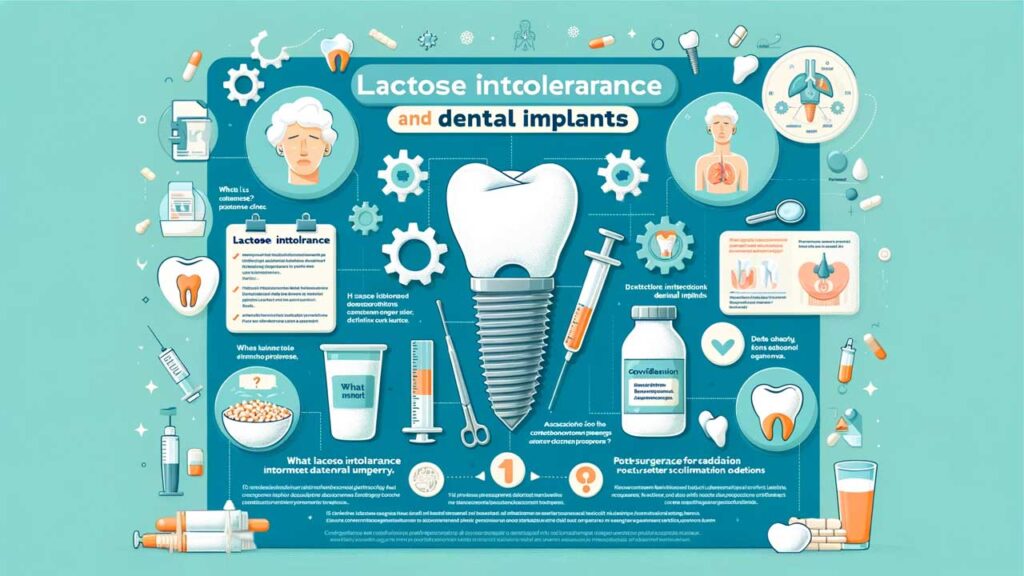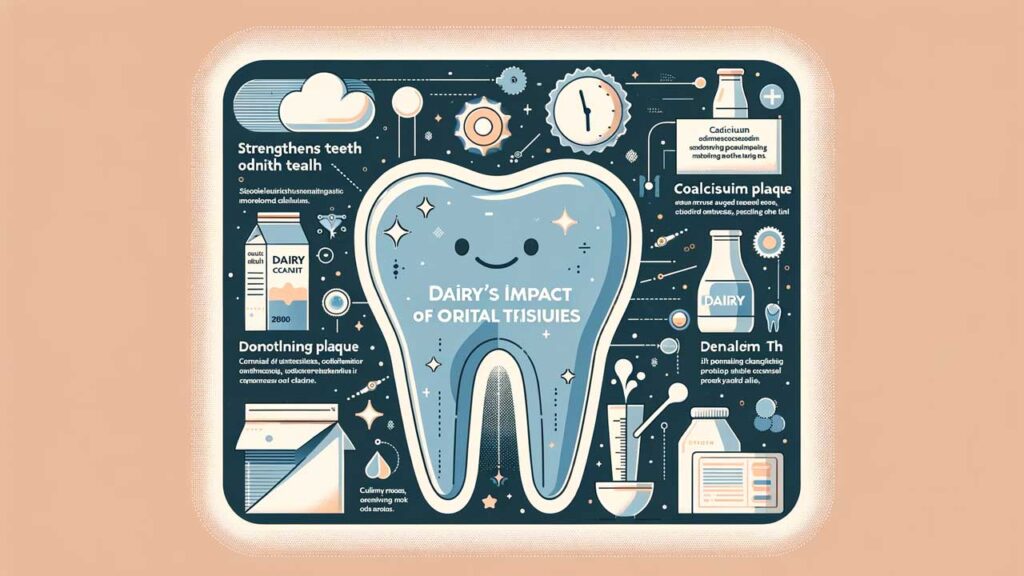Dental implants are a great fix for missing teeth and they help bring back your confidence in your smile. After you get these implants, there’s a special way you need to take care of yourself to heal the right way. One important thing dentists usually tell you is to avoid dairy products like milk or cheese right after your surgery. This article is going to explain ‘why no dairy after dental implant‘ is such important advice to follow.

Choosing to get a dental implant is more than just filling a gap in your teeth. It’s about getting your confidence back and enjoying eating again. But, like after any surgery, you’ve got to follow some special care rules to heal well.
A big rule is not eating dairy products while you’re healing. We’re going to explore ‘why no dairy after dental implant’ is a key piece of advice and help you understand why it’s so crucial to follow this guideline after your implant surgery.
Brief Overview of Dental Implant Procedure
Dental implants, serving as artificial roots for teeth, offer a strong foundation for fixed or removable replacement teeth. The procedure involves the surgical insertion of a titanium post into the jawbone beneath the gum line, enabling dentists to affix replacement teeth or bridges. A crucial aspect of this process is the post’s ability to bond with the bone, known as osseointegration.
It’s essential to facilitate this bonding process and ensure healing post-surgery. This is where dietary considerations, particularly “Why No Dairy After Dental Implant?” come into play. Avoiding dairy products post-implant surgery is often recommended to minimize the risk of infection and to support the healing process, ensuring the success and longevity of the dental implant.
Mention of Dietary Restrictions Post Procedure
Following the surgery, adhering to dietary guidelines is crucial to avoid complications and ensure the success of the implant. Certain foods and beverages, including dairy, are advised to be avoided to create a healing-friendly environment.
Introducing the Focus on Dairy Avoidance
Dairy products, while nutritious, have characteristics that may be unfavorable during the healing phase. The emphasis on avoiding dairy post dental implant arises from its potential to cause inflammation, hinder blood clot formation, and promote bacterial growth in the mouth.
The understanding of the rationale behind the no-dairy guideline can enable patients to follow dietary recommendations diligently, leading to a smoother recovery journey. Through the lens of science, expert opinions, and real-life instances, this article aims to offer a well-rounded explanation of the advice to steer clear of dairy after a dental implant procedure.
In short, Why No Dairy After Dental Implant: A Comprehensive Guide?
Avoiding dairy after dental implant surgery is typically recommended due to the risk of infection and to facilitate healing. Dairy products, particularly those that are not pasteurized, can contain bacteria which might increase the risk of infection in the vulnerable post-surgery phase.
Additionally, some dairy products are hard or chewy, which could potentially disrupt the implant site or put undue pressure on it during the critical healing period. It’s crucial to follow a soft diet that minimizes chewing and stress on the implant area.
However, it’s always best to follow the specific dietary guidelines provided by your dental surgeon, as recommendations can vary based on individual cases and the specifics of the surgical procedure. To understand more about Why No Dairy After Dental Implant, the reasons and guidelines, read the full blog for a comprehensive guide.
Understanding Dental Implants
Dental implants are a modern solution for replacing missing teeth. They are designed to blend in with your other teeth, offering a natural look along with stability and comfort. Let’s explore the dental implant process and its post-operative care essentials.
Definition and Purpose of Dental Implants
Dental implants are artificial teeth roots that provide a permanent base for fixed, replacement teeth. Compared to dentures, bridges, and crowns, dental implants are a popular and effective long-term solution for people who suffer from missing teeth, failing teeth, or chronic dental problems. Dental implants fit, feel, and function like natural teeth, and are a sturdy, long-term solution that offers the closest thing to your natural teeth.
The Process of Getting a Dental Implant
Getting dental implants is a multi-step process that typically occurs across multiple visits to the dentist. Here’s a simplified breakdown:
- Consultation: A thorough examination where your dentist will review your dental and medical history, take X-rays, and create a personalized treatment plan.
- Preparation: This might include tooth extractions or bone grafting to ensure your jawbone can support the implant.
- Implant Placement: Your dentist places the metal implant post into your jawbone. This will serve as the root of your artificial tooth.
- Healing: Over the next few months, your bone grows around the implant in a process called osseointegration.
- Abutment Placement: Once healed, an abutment is placed on the implant to hold the new tooth.
- Crown Placement: Finally, your custom-made crown (the visible part of the tooth) is placed on the abutment.
Importance of Post-Operative Care in Dental Implants
Post-operative care is crucial to ensure the success and longevity of your dental implants. Following your dentist’s guidelines diligently can prevent complications and promote healing. These guidelines often include dietary restrictions, oral hygiene practices, and follow-up appointments for monitoring the healing process.
The Science Behind No Dairy Post-Implant
The suggestion to avoid dairy after getting a dental implant is not arbitrary but is grounded in scientific reasoning. Dairy products, although nutritious, possess certain attributes that can be counterproductive during the healing phase.
General Dietary Guidelines Post Dental Implant
After getting a dental implant, there are certain dietary guidelines that one must follow to ensure the success and longevity of the implant. Here’s a comparison table showing the foods to enjoy and those to avoid:
| Foods to Enjoy | Foods to Avoid |
| Soft fruits | Dairy products |
| Mashed vegetables | Hard candies |
| Smoothies | Popcorn |
| Soups | Nuts |
| Cooked tender meats | Ice |
| Eggs | Raw veggies |
These dietary guidelines help in fostering a conducive environment for healing and preventing any complications post-implant.
Explanation of Scientific Reasoning Behind Dairy Avoidance

Dairy products can trigger inflammation, especially around the implant site, which could lead to implant failure. The richness of calcium in dairy might interfere with blood clot formation, a critical part of the initial healing process post-implant. Moreover, the lactic acid present in dairy products can encourage the growth of bacteria in the mouth, raising the risk of infection.
Impact of Dairy on Healing Phase
The healing phase post dental implant procedure is crucial as it determines the success of the implant. Dairy products, due to their potential to cause inflammation and interfere with blood clotting, can jeopardize this healing process. Understanding the impact of dairy and following the recommended dietary guidelines can significantly aid in a smoother and faster healing process post dental implant surgery.
Inflammation and Dental Implants
Inflammation is a natural response of our bodies to injury or surgery, and it plays a significant role in the healing process. However, when it comes to dental implants, controlling inflammation is crucial for successful healing and implant integration. This is where dietary considerations, particularly the question of “Why No Dairy After Dental Implant?”, become important.
Dairy products can influence the body’s inflammatory response. While dairy is generally considered to be anti-inflammatory and beneficial for overall health, in the context of post-surgical healing, such as after dental implant surgery, it can have different implications. Some dairy products, especially those that are not pasteurized, might contain bacteria that could potentially increase the risk of infection and subsequent inflammation at the implant site. Additionally, dairy products that are hard or chewy can cause physical stress on the new implant, potentially disrupting the healing process.
Therefore, the recommendation of avoiding dairy after dental implant surgery is primarily to reduce the risk of infection and to ensure that the inflammation necessary for healing is not exacerbated. It’s a precautionary measure to ensure that the implant integrates successfully with the jawbone without any complications. Understanding this aspect is key to ensuring a smooth recovery and long-term success of the dental implant.
Role of Inflammation in Healing
Inflammation is our body’s way to fight off harmful stimuli like bacteria or viruses, and to kick-start the healing process after an injury or surgery. It’s a double-edged sword; while necessary for healing, excessive inflammation can be detrimental.
- Protection: Initially, inflammation helps in protecting the surgical site from infections and other harmful elements.
- Healing Promotion: It also plays a crucial role in promoting healing by delivering necessary nutrients and cells to the surgical site.
How Dairy Triggers Inflammation Around the Implant Site

Dairy products are known to trigger inflammatory responses, especially in individuals who have a sensitivity or intolerance to lactose. When it comes to the delicate healing environment of a dental implant site, even a slight increase in inflammation can cause problems.
- Irritation: Dairy products can cause irritation around the implant site, making the area more prone to infection and delaying the healing process.
- Implant Failure Risk: Excessive inflammation can potentially lead to implant failure if not controlled timely.
Consequences of Excessive Inflammation on Implant Success
The success of a dental implant relies heavily on the controlled inflammatory response during the healing phase. Excessive inflammation, on the other hand, can lead to several issues.
- Delayed Healing: The healing process can be significantly delayed, impacting the overall recovery timeline.
- Implant Failure: In severe cases, excessive inflammation can lead to implant failure, requiring additional procedures or even removal of the implant.
Understanding the relationship between dairy, inflammation, and dental implant healing can empower patients to make informed dietary choices post-implant surgery, significantly contributing to the success and longevity of the dental implant.
Blood Clot Formation Post-Implant
The formation of a blood clot at the implant site is a critical initial step in the healing process post dental implant surgery. This natural response of the body is essential for successful implant integration and healing. However, it’s important to consider dietary choices during this period, particularly the consumption of dairy products.
Understanding “Why No Dairy After Dental Implant?” becomes crucial in this context. Dairy products, especially those that are unpasteurized, can harbor bacteria which might disrupt the blood clot formation or increase the risk of infection at the implant site.
Additionally, some dairy products are hard or chewy, posing a risk to the delicate clot by potentially dislodging or stressing it. Therefore, avoiding dairy right after dental implant surgery is often advised to ensure optimal healing and to safeguard the success of the implant.
Significance of Blood Clot Formation in Initial Healing
The clotting of blood at the implant site acts as a protective barrier, safeguarding the site from infections and aiding tissue regeneration.
- Infection Prevention: The blood clot acts as a seal, preventing bacteria and other harmful elements from entering the surgical site.
- Tissue Regeneration: The blood clot also provides a scaffold for new tissue to grow, facilitating the healing process.
Effects of Dairy on Blood Clotting
Dairy products, particularly due to their richness in calcium, can impede the clotting process, thereby jeopardizing the healing of the implant.
- Interference with Clot Formation: The calcium in dairy might interfere with the blood clot formation, which is crucial for initiating the healing process.
- Potential Delay in Healing: Any delay or disruption in blood clot formation can potentially delay the healing process, impacting the overall recovery timeline.
Long-Term Impact on Implant Healing
The long-term success of a dental implant is significantly influenced by the initial healing phase. Ensuring proper blood clot formation by avoiding dairy can contribute to a smoother healing process and ultimately a successful dental implant integration.
Adhering to dietary guidelines, including avoiding dairy, can significantly contribute to the successful healing and long-term success of your dental implant. Through understanding the science and implications of dietary choices post dental implant surgery, patients can better adhere to dietary guidelines, ensuring a smoother recovery and long-term success of their dental implant.
Bacterial Growth and Dairy Consumption
The mouth is home to a diverse community of bacteria, some beneficial and some harmful. Post dental implant surgery, controlling bacterial growth is paramount to prevent infections and ensure successful healing. Dairy products can play a significant role in this bacterial dynamic.
Overview of Oral Bacteria and Dental Health
A balanced bacterial environment in the mouth is crucial for dental health. Here’s how it works:
- Beneficial Bacteria: These help in breaking down food particles and maintaining a balanced oral environment.
- Harmful Bacteria: These can cause dental issues like cavities, gum disease, and infections, especially post-surgery.
Lactic Acid in Dairy and Its Effects on Bacterial Growth
Dairy products contain lactic acid, which can encourage the growth of harmful bacteria in the mouth.
- Acidic Environment: Lactic acid can create an acidic environment, favorable for harmful bacterial growth.
- Increased Risk of Infection: With an increased bacterial count, the risk of infection at the implant site goes up, which can be detrimental to the healing process.
Risk of Infection Due to Bacterial Proliferation Post-Implant
An infection post-implant can lead to serious complications and may even result in implant failure.
- Delayed Healing: Infections can significantly delay the healing process, requiring additional treatment and extended recovery time.
- Potential Implant Failure: Severe infections can lead to implant failure, necessitating removal and replacement of the implant.
Understanding the relationship between dairy consumption, bacterial growth, and infection risk post dental implant can guide better dietary choices during the healing phase, contributing to a smoother recovery and a successful dental implant experience.
Lactose Intolerance and Dental Implants

Lactose intolerance is a common digestive disorder where the body is unable to digest lactose, a type of sugar found in milk and dairy products. This section explores the implications of lactose intolerance on dental implant healing.
Commonality of Lactose Intolerance
Many people experience lactose intolerance, which can cause symptoms like bloating, diarrhea, and abdominal cramps.
- Digestive Discomfort: The inability to digest lactose can cause discomforting digestive symptoms, which can be bothersome post-implant.
- Pressure on Implant Site: The bloating and gas associated with lactose intolerance can exert pressure on the implant site, potentially disrupting the healing process.
Symptoms of Lactose Intolerance Affecting Implant Site
The symptoms of lactose intolerance can be more than just a minor discomfort post dental implant surgery.
- Physical Discomfort: The physical discomfort from bloating and gas can be particularly bothersome when healing from dental implant surgery.
- Potential Dislodging: Severe bloating and gas can potentially disturb the implant site, slowing down the healing process substantially.
Recommendations for Lactose Intolerant Individuals Post-Implant
For individuals with lactose intolerance, adhering to the no-dairy guideline post dental implant surgery is particularly important.
- Avoidance of Dairy: Steering clear of dairy can prevent the uncomfortable symptoms of lactose intolerance, promoting a smoother healing process.
- Alternative Nutritional Sources: Opting for lactose-free nutritional sources can help in maintaining dietary balance while adhering to post-implant dietary guidelines.
Being aware of the interaction between lactose intolerance and dental implant healing can help in making informed dietary choices, ensuring a comfortable and successful recovery post dental implant surgery.
Dairy’s Impact on Oral Tissues

The consumption of dairy can have a significant impact on the tissues in your mouth, especially after a dental implant procedure. It’s essential to understand how dairy affects oral tissues to ensure a smooth healing process.
Dairy-Induced Inflammation in Soft Oral Tissues
Dairy products have the potential to cause irritation and inflammation in the soft tissues of the mouth. This is particularly concerning following a dental implant procedure.
- Increased Sensitivity: The soft tissues around the implant site may become more sensitive post-procedure. Dairy products can exacerbate this sensitivity, causing discomfort.
- Potential for Prolonged Healing: Dairy-induced inflammation can prolong the healing process, making recovery more tedious and drawn-out.
Resulting Discomfort and Potential Implant Failure
The discomfort caused by dairy-induced inflammation can be quite bothersome, and in severe cases, it might even threaten the success of the dental implant.
- Pain and Swelling: Increased inflammation can result in more pain and swelling around the implant site.
- Risk of Implant Failure: Chronic inflammation can potentially lead to implant failure if not adequately managed.
Experts’ Stance on Dairy Consumption Post-Implant
Dental professionals often advise against dairy consumption during the initial healing phase to prevent these issues and promote a successful recovery.
- Guided Recovery: Following the dietary guidelines provided by your dental surgeon can significantly aid in a smoother, more comfortable recovery process.
- Preventive Measure: Avoiding dairy is a preventive measure to ensure the implant heals properly and integrates well with the bone.
Exploring Nutritional Alternatives
For those wondering “Why No Dairy After Dental Implant?” it’s important to note that while avoiding dairy is a key post-surgical guideline, it raises the question of how to compensate for the nutritional gap, particularly in terms of calcium and protein intake.
Fortunately, there are numerous alternative sources of these essential nutrients that can be seamlessly integrated into your diet. This ensures you maintain a balanced nutritional intake while adhering to the specific dietary recommendations following your dental implant procedure.
These alternatives not only support your overall health but also aid in the healing process, ensuring a successful post-implant recovery.
Importance of Calcium and Protein in Diet
Calcium and protein are crucial for bone health and tissue repair, making them essential nutrients during the healing phase post dental implant procedure.
- Bone Health: Calcium is vital for bone health, which is crucial for the success of a dental implant.
- Tissue Repair: Protein plays a significant role in tissue repair and healing, making it an essential nutrient post-procedure.
Plant-Based Milk, Leafy Greens, Nuts, Seeds, and Fish as Alternatives
There are several nutritious alternatives to dairy that can provide the necessary calcium and protein without disrupting the healing process.
- Plant-Based Milk: Almond, soy, and oat milk are excellent dairy substitutes that can provide a good amount of calcium and protein.
- Leafy Greens: Kale and spinach are calcium-rich and great for overall health.
- Nuts and Seeds: Besides being protein-rich, they also provide a good amount of calcium.
- Fish: Certain fish like salmon and sardines are not only rich in protein but also calcium.
Balancing Nutritional Needs While Adhering to Post-Implant Dietary Guidelines
Maintaining a balanced diet while following the post-implant dietary guidelines is crucial for a successful recovery.
- Consulting a Nutritionist: If you’re concerned about maintaining a balanced diet while avoiding dairy, consulting a nutritionist can be beneficial.
- Regular Monitoring: Regular follow-ups with your dental surgeon can also help in ensuring that your dietary choices are contributing positively to your recovery.
By exploring these nutritional alternatives, not only can you adhere to the post-implant dietary guidelines, but also pave the way for a balanced diet that supports your overall health and the success of your dental implant.
Real-life Cases of Dairy Impacting Implant Healing
Hearing about real-life cases can provide a tangible insight into the impact of dairy on the healing process post dental implant surgery. These instances shed light on why following dietary guidelines, including avoiding dairy, is crucial for a successful recovery.
Personal Experiences Shared by Individuals
Numerous individuals have shared their experiences regarding the impact of dairy on their dental implant healing process.
- Delayed Healing: Some individuals have reported delayed healing and increased discomfort when they consumed dairy products post-implant surgery.
- Infections: Others have mentioned instances of infections which they attribute to not adhering to the no-dairy guideline.
Dentists’ Observations on Healing Progress with/without Dairy
Dentists and oral surgeons have observed differences in the healing progress among patients who avoided dairy versus those who did not.
- Faster Healing: It’s often observed that patients who adhere to the no-dairy guideline tend to heal faster and face fewer complications.
- Fewer Infections: The incidence of infections is notably lower in patients who avoid dairy during the initial healing phase.
Tangible Insights Derived from Real-world Examples
Real-world examples provide tangible insights and underscore the importance of adhering to dietary guidelines post dental implant surgery.
- Better Understanding: These real-life cases help in understanding the practical implications of dietary guidelines.
- Informed Decisions: Armed with this knowledge, individuals can make informed decisions regarding their dietary choices post-implant surgery.
Expert Opinions and Recommendations
Expert opinions and guidelines form a robust basis for understanding the importance of avoiding dairy post dental implant surgery. Here’s what experts have to say:
Renowned Dentists’ Guidelines on Dairy Consumption Post-Implant
Reputed dentists often provide clear guidelines regarding dietary restrictions post dental implant surgery to ensure a smooth recovery.
- Dairy Avoidance: They recommend avoiding dairy to prevent potential inflammation and infections.
- Individualized Advice: They often provide personalized advice based on individual circumstances and the specifics of the dental implant procedure undertaken.
Importance of Tailored Diet Plans and Regular Follow-ups
Adhering to tailored diet plans and regular follow-ups with your dentist can significantly contribute to the success of the dental implant.
- Monitoring Progress: Regular follow-ups allow the dentist to monitor the healing progress and provide any necessary dietary adjustments.
- Addressing Concerns: Any concerns regarding dietary restrictions or healing progress can be promptly addressed during these follow-up visits.
Ensuring Successful Healing and Longevity of Dental Implants
The ultimate goal is to ensure the successful healing and longevity of the dental implant, and adhering to expert dietary guidelines is a significant step towards achieving this goal.
- Adherence to Guidelines: Strict adherence to dietary guidelines including avoiding dairy, contributes to a successful recovery.
- Long-term Success: Following expert advice can significantly contribute to the long-term success and functionality of the dental implant.
Adhering to expert guidelines and understanding the rationale behind dietary restrictions can significantly contribute to making the dental implant experience smooth and successful.
Debunking Common Myths
When it comes to the topic of avoiding dairy post dental implant surgery, there are several myths and misconceptions that may circulate. It’s essential to debunk these myths to have a clear and accurate understanding of the dietary guidelines necessary for a successful dental implant experience.
Addressing Common Misconceptions around Dairy Consumption Post-Implant
Some common misconceptions might lead individuals to overlook the importance of dietary guidelines.
- Myth of Nutrient Deficiency: One common myth is that avoiding dairy will lead to a severe deficiency in essential nutrients like calcium and protein. However, as discussed earlier, there are plenty of alternative nutritional sources available.
- Misconception about Immediate Recovery: Another misconception is that the healing post dental implant procedure is swift, and dietary choices don’t significantly impact the recovery process. In reality, the healing process is delicate, and dietary guidelines play a crucial role in a successful recovery.
Clarifying the Temporary Nature of Dairy Avoidance
It’s important to note that the avoidance of dairy is typically a temporary measure to aid in the healing process.
- Temporary Measure: The recommendation to avoid dairy usually lasts for a specific duration post-surgery, as advised by your dentist.
- Resuming Dairy Consumption: Once the healing process has progressed satisfactorily, and with the approval of your dentist, dairy products can be gradually reintroduced into your diet.
Reiterating the Scientific Basis of These Dietary Guidelines
It’s crucial to reiterate that the guideline to avoid dairy post dental implant surgery is rooted in scientific reasoning and professional expertise.
- Informed Guidelines: The guidelines are derived from a thorough understanding of the healing process, potential risks, and the impact of dietary choices on recovery.
- Expert Recommendations: Dental professionals provide these guidelines based on evidence and their professional experience to ensure a smooth and successful healing process.
Why No Dairy After Dental Implant: A Final Verdict
Understanding the reasons behind the advice of “Why No Dairy After Dental Implant” is crucial for anyone undergoing this surgical procedure. Avoiding dairy products post dental implant surgery is a key guideline advised by dental professionals to ensure a smooth healing process.
The consumption of dairy can trigger inflammation, hinder the formation of essential blood clots, and foster harmful bacterial growth in the mouth. Such effects can potentially jeopardize the success of the dental implant. This guideline, while temporary, plays a crucial role in reducing complications and promoting a conducive environment for healing.
By adhering to this and other dietary guidelines, including the avoidance of dairy, individuals are better positioned to achieve successful recovery and enjoy the long-term benefits of their dental implants.
Conclusion
Navigating the path to recovery after receiving a dental implant involves a keen understanding of post-operative care, including the important guideline of “Why No Dairy After Dental Implant: A Comprehensive Guide?” during the early stages of healing. This critical advice, grounded in scientific evidence and professional expertise, plays a vital role in the journey towards restoring your smile and functionality.
Grasping the reasons behind the recommendation to avoid dairy after dental implant surgery is key. It not only informs patients of the necessary precautions but also empowers them to follow dietary guidelines more conscientiously as outlined in the guide.
Strict adherence to post-operative instructions, such as dietary limitations detailed in “Why No Dairy After Dental Implant: A Comprehensive Guide?”, paves the way for a seamless recovery. This careful attention to detail is essential for the long-term success and durability of the dental implant.
This article aims to demystify the rationale behind the specific advice of avoiding dairy products following dental implant surgery. By delving into scientific explanations, expert viewpoints, and real-world experiences, it provides a comprehensive and well-rounded understanding of this critical aspect of post-operative care as presented in “Why No Dairy After Dental Implant: A Comprehensive Guide?”.
Frequently Asked Questions (FAQ)
Why is blood clot formation crucial post dental implant?
Blood clot formation acts as a natural protective barrier, preventing infections and aiding in the initial healing process by providing a scaffold for new tissue growth.
How can one compensate for the nutritional gap left by dairy avoidance?
Compensating for the nutritional gap can be achieved by incorporating alternative sources of essential nutrients, such as plant-based milk, leafy greens, nuts, seeds, and certain fish into your diet.
What are some common symptoms of lactose intolerance affecting dental implant healing?
Common symptoms include bloating, gas, and diarrhea, which can cause discomfort and potentially disturb the implant site, affecting the healing process.
Why is inflammation a double-edged sword in dental implant healing?
Inflammation is crucial for fighting infections and promoting healing, but excessive inflammation can delay the healing process, increase discomfort, and in severe cases, lead to implant failure.
How does dairy affect bacterial growth in the mouth post dental implant?
The lactic acid present in dairy products can create an acidic environment in the mouth, promoting the growth of harmful bacteria, which can increase the risk of infection at the implant site.
